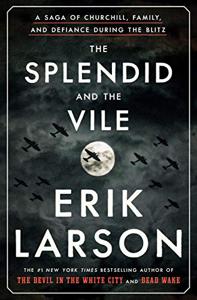
Want to learn the ideas in The Splendid And The Vile better than ever? Read the world’s #1 book summary of The Splendid And The Vile by Erik Larson here.
Read a brief 1-Page Summary or watch video summaries curated by our expert team. Note: this book guide is not affiliated with or endorsed by the publisher or author, and we always encourage you to purchase and read the full book.
Video Summaries of The Splendid And The Vile
We’ve scoured the Internet for the very best videos on The Splendid And The Vile, from high-quality videos summaries to interviews or commentary by Erik Larson.
1-Page Summary of The Splendid And The Vile
Overview
Winston Churchill was a great leader at a time when Britain needed him most. Europe watched in horror as Hitler expanded his territory, invading countries and bombing cities into submission. If you opposed the Nazis, they would bomb your city to rubble.
Even though the British had an air force, they were worried about Germany because it was far away. However, that changed when Hitler invaded France and Britain’s fate seemed uncertain. But even though Churchill didn’t think France would fall, he still believed in his country’s strength. He knew if he could just hold on long enough until America joined the war, then Britain would win. In these key points you’ll learn how a Nazi official tried to broker peace with Churchill; how Churchill gave FDR one of his wildest strategy meetings ever; and how holding out for American help won him the war.
Big Idea #1: From day one, Churchill was clear on his goal: getting American help.
By May 1940, it was clear that the Nazis were going to invade Britain.
After the vote of no confidence in Neville Chamberlain, who had tried to appease Hitler’s expansionist tendencies, Winston Churchill took over. He was a different man from Chamberlain—and everyone else—because he believed that Britain could win the war against Germany.
Now, Churchill had to convince his country and the United States that there was a chance of winning. He knew that he couldn’t win without the US’s help.
The author’s key message is: From the very beginning, Churchill was clear about his goal of getting American help. The Americans were not interested in sending their young men to fight on European battlefields again. They also did not want to work with Churchill because they thought he was unreliable when drunk.
Churchill was different from most other politicians. He took his baths at odd hours, and he often worked in them. If the phone rang while he was in the bath, he would climb out of it to answer it. He liked to wear brightly colored dressing gowns when walking around late at night or early in the morning.
The British people loved Churchill and he took their trust seriously. He was a great speaker and his speeches were always optimistic, even when things looked bleak. His first speech to the House of Commons demonstrated this signature oratory style: sober appraisal of facts followed by reason for measured optimism. “I have nothing to offer but blood, sweat, tears and hard work”
Despite the dire situation, Churchill was able to bring a sense of urgency and purpose to his government. Everyone from the lowest civil servant to the highest minister was working together toward a common goal: preventing Germany from invading England and winning World War II. Civil servants who were once seen as stuffy bureaucrats were now running through hallways on their way to important meetings. It didn’t take long for things in Britain to turn around after Churchill took office; however, they would soon become even worse than before.
Big Idea #2: A heroic grassroots rescue gave Britain the morale boost it needed for the fight ahead.
The war in Europe was already difficult. The French were fighting the Nazis on their own soil, and it seemed like they had an advantage because of their military strength and the Maginot Line. But then something unexpected happened: Nazi forces broke through France’s defenses, and Allied troops scrambled away from them. Faced with defeat, the French president called Churchill to tell him that France had been defeated. After a stunned pause, Churchill asked whether this meant that Nazi forces could be in Britain soon. With Germany having established itself on French soil, it seemed inevitable that they would invade Britain next.





